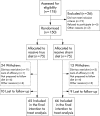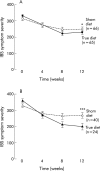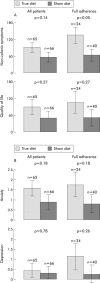Food elimination based on IgG antibodies in irritable bowel syndrome: a randomised controlled trial - PubMed (original) (raw)
Clinical Trial
Food elimination based on IgG antibodies in irritable bowel syndrome: a randomised controlled trial
W Atkinson et al. Gut. 2004 Oct.
Abstract
Background: Patients with irritable bowel syndrome (IBS) often feel they have some form of dietary intolerance and frequently try exclusion diets. Tests attempting to predict food sensitivity in IBS have been disappointing but none has utilised IgG antibodies.
Aims: To assess the therapeutic potential of dietary elimination based on the presence of IgG antibodies to food.
Patients: A total of 150 outpatients with IBS were randomised to receive, for three months, either a diet excluding all foods to which they had raised IgG antibodies (enzyme linked immunosorbant assay test) or a sham diet excluding the same number of foods but not those to which they had antibodies.
Methods: Primary outcome measures were change in IBS symptom severity and global rating scores. Non-colonic symptomatology, quality of life, and anxiety/depression were secondary outcomes. Intention to treat analysis was undertaken using a generalised linear model.
Results: After 12 weeks, the true diet resulted in a 10% greater reduction in symptom score than the sham diet (mean difference 39 (95% confidence intervals (CI) 5-72); p = 0.024) with this value increasing to 26% in fully compliant patients (difference 98 (95% CI 52-144); p<0.001). Global rating also significantly improved in the true diet group as a whole (p = 0.048, NNT = 9) and even more in compliant patients (p = 0.006, NNT = 2.5). All other outcomes showed trends favouring the true diet. Relaxing the diet led to a 24% greater deterioration in symptoms in those on the true diet (difference 52 (95% CI 18-88); p = 0.003).
Conclusion: Food elimination based on IgG antibodies may be effective in reducing IBS symptoms and is worthy of further biomedical research.
Figures
Figure 1
Study flow diagram.
Figure 2
Mean change in symptom severity scores at 12 weeks according to degree of adherence. Difference between the groups with high adherence: 101 (95% confidence interval 54, 147); ***p<0.001.
Figure 3
(A) Average symptom severity scores over time for the group as a whole. Difference in mean change from baseline at 12 weeks: true versus sham 39 (95% confidence interval 5, 72); *p = 0.024. (B) Average symptom severity scores over time for the full adherence group. Difference in mean change from baseline at 12 weeks: true versus sham 98 (95% confidence interval 52, 144); ***p<0.001.
Figure 4
(A) Mean change in the secondary outcome measures of non-colonic symptoms and quality of life for the group as a whole and the full adherence group. (B) Mean change in the secondary outcome measures of anxiety and depression for the group as a whole and the full adherence group.
Comment in
- Food allergy in irritable bowel syndrome: new facts and old fallacies.
Isolauri E, Rautava S, Kalliomäki M. Isolauri E, et al. Gut. 2004 Oct;53(10):1391-3. doi: 10.1136/gut.2004.044990. Gut. 2004. PMID: 15361481 Free PMC article. - IgG food antibodies should be studied in similarly treated groups.
Sewell WA. Sewell WA. Gut. 2005 Apr;54(4):566. Gut. 2005. PMID: 15753547 Free PMC article. No abstract available. - IgG antibodies to foods in IBS.
Mawdsley JE, Irving P, Makins R. Mawdsley JE, et al. Gut. 2005 Apr;54(4):567. Gut. 2005. PMID: 15753552 Free PMC article. No abstract available. - Food elimination in IBS: the case for IgG testing remains doubtful.
Hunter JO. Hunter JO. Gut. 2005 Aug;54(8):1203; author reply 1203. Gut. 2005. PMID: 16009694 Free PMC article. No abstract available.
Similar articles
- [The therapeutic effects of eliminating allergic foods according to food-specific IgG antibodies in irritable bowel syndrome].
Yang CM, Li YQ. Yang CM, et al. Zhonghua Nei Ke Za Zhi. 2007 Aug;46(8):641-3. Zhonghua Nei Ke Za Zhi. 2007. PMID: 17967233 Chinese. - Food-specific IgG4 antibody-guided exclusion diet improves symptoms and rectal compliance in irritable bowel syndrome.
Zar S, Mincher L, Benson MJ, Kumar D. Zar S, et al. Scand J Gastroenterol. 2005 Jul;40(7):800-7. doi: 10.1080/00365520510015593. Scand J Gastroenterol. 2005. PMID: 16109655 - IgG-based elimination diet in migraine plus irritable bowel syndrome.
Aydinlar EI, Dikmen PY, Tiftikci A, Saruc M, Aksu M, Gunsoy HG, Tozun N. Aydinlar EI, et al. Headache. 2013 Mar;53(3):514-25. doi: 10.1111/j.1526-4610.2012.02296.x. Epub 2012 Dec 6. Headache. 2013. PMID: 23216231 Clinical Trial. - The Role of Diet in the Treatment of Irritable Bowel Syndrome: A Systematic Review.
Singh R, Salem A, Nanavati J, Mullin GE. Singh R, et al. Gastroenterol Clin North Am. 2018 Mar;47(1):107-137. doi: 10.1016/j.gtc.2017.10.003. Gastroenterol Clin North Am. 2018. PMID: 29413008 Review.
Cited by
- Biological, psychological and social processes that explain celebrities' influence on patients' health-related behaviors.
Hoffman SJ, Tan C. Hoffman SJ, et al. Arch Public Health. 2015 Jan 19;73(1):3. doi: 10.1186/2049-3258-73-3. eCollection 2015. Arch Public Health. 2015. PMID: 25973193 Free PMC article. - Personality traits and emotional patterns in irritable bowel syndrome.
Muscatello MR, Bruno A, Mento C, Pandolfo G, Zoccali RA. Muscatello MR, et al. World J Gastroenterol. 2016 Jul 28;22(28):6402-15. doi: 10.3748/wjg.v22.i28.6402. World J Gastroenterol. 2016. PMID: 27605876 Free PMC article. Review. - Changing face of irritable bowel syndrome.
Quigley EM. Quigley EM. World J Gastroenterol. 2006 Jan 7;12(1):1-5. doi: 10.3748/wjg.v12.i1.1. World J Gastroenterol. 2006. PMID: 16440408 Free PMC article. Review. - Gluten-free Diet Reduces the Risk of Irritable Bowel Syndrome: A Mendelian Randomization Analysis.
Sun Y, Chen X, Wang S, Deng M, Xie Y, Wang X, Chen J, Hesketh T. Sun Y, et al. Front Genet. 2021 Nov 9;12:684535. doi: 10.3389/fgene.2021.684535. eCollection 2021. Front Genet. 2021. PMID: 34899821 Free PMC article. - The Food-Specific Serum IgG Reactivity in Major Depressive Disorder Patients, Irritable Bowel Syndrome Patients and Healthy Controls.
Karakula-Juchnowicz H, Gałęcka M, Rog J, Bartnicka A, Łukaszewicz Z, Krukow P, Morylowska-Topolska J, Skonieczna-Zydecka K, Krajka T, Jonak K, Juchnowicz D. Karakula-Juchnowicz H, et al. Nutrients. 2018 Apr 28;10(5):548. doi: 10.3390/nu10050548. Nutrients. 2018. PMID: 29710769 Free PMC article.
References
- Drossman DA, Camilleri M, Mayer EA, et al. American Gastroenterological Association Technical Review on Irritable Bowel Syndrome. Gastroenterology 2002;123:2108–31. - PubMed
- Lea R , Whorwell PJ. Quality of life in irritable bowel syndrome. Pharmacoeconomics 2001;19:643–53. - PubMed
- Talley NJ, Spiller R. Irritable bowel syndrome: a little understood organic bowel disease? Lancet 2002;360:555–64. - PubMed
- Jones VA, McLaughlan P, Shorthouse M, et al. Food intolerance: a major factor in pathogenesis of irritable bowel syndrome. Lancet 1982;2:1115–17. - PubMed
Publication types
MeSH terms
Substances
LinkOut - more resources
Full Text Sources
Other Literature Sources
Medical



